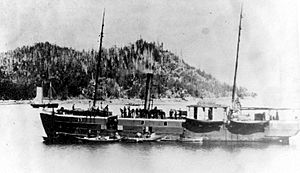Otter (steamship) facts for kids

The Otter around 1852
|
|
Quick facts for kids History |
|
|---|---|
| Name | Otter |
| Builder | Blackwall Yard |
| Laid down | London, England |
| Launched | 1852 |
| In service | 1852 |
| Out of service | 1886 |
| Status | burned for scrap in 1895 |
| General characteristics | |
| Length | 122 feet (37 m) |
| Beam | 20 feet (6.1 m) |
| Draft | 12 feet (3.7 m) |
| Propulsion | screw-steamer |
The Otter was an important early steamship in the Pacific Northwest region of North America. It was the second steam-powered ship to operate there. The Otter was like a twin sister ship to the more famous Beaver.
The Otter was built in London, England, in 1852. It was made for the Hudson's Bay Company. This was a very large trading company. The company used the Otter to visit its trading posts. These posts were located from Puget Sound all the way up to Alaska.
Contents
Life of the Otter
The Otter was a special type of ship called a sidewheeler. This means it had large paddle wheels on its sides to move through the water. It helped transport goods and people for the Hudson's Bay Company.
Role in the Gold Rush
From 1858 onwards, the Otter became very busy. This was because of the Fraser Gold Rush. Many people rushed to the Fraser River in British Columbia. They hoped to find gold there. The Otter helped carry these people and supplies. It worked on the lower part of the Fraser River.
Captain and Adventures
From April 16, 1855, to April 3, 1862, William Alexander Mouat was the captain of the Otter. The ship had some adventures during its time. On August 21, 1880, the Otter actually sank. But it was pulled out of the water and fixed. After repairs, it went back to work.
Later Years and End
In 1883, the Otter was sold. The Canadian Pacific Navigation Company bought it. They changed the ship in 1886. The Otter was turned into a "coal hulk." This means it was used to store coal. It no longer sailed on its own.
Finally, in 1895, the Otters hull was burned. This was done to get back the valuable copper metal from its structure. This was the end of the Otters long and busy life.
See also
- List of steamboats on the Columbia River
- List of ships in British Columbia
 | Toni Morrison |
 | Barack Obama |
 | Martin Luther King Jr. |
 | Ralph Bunche |

